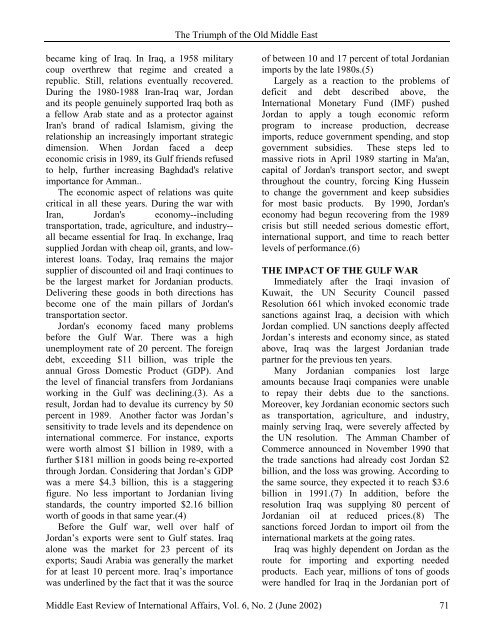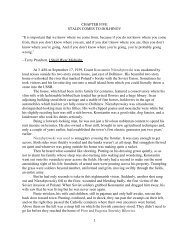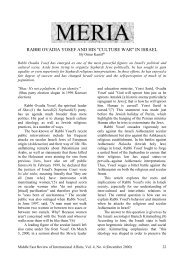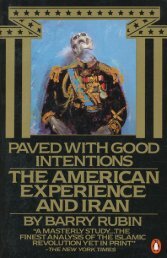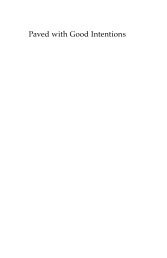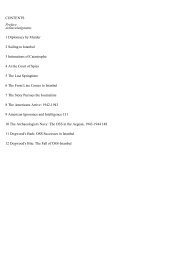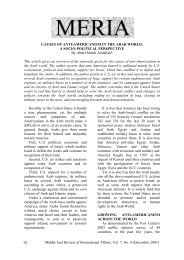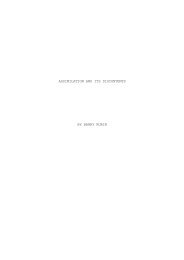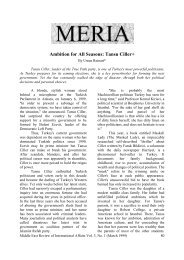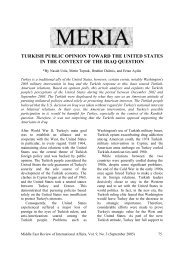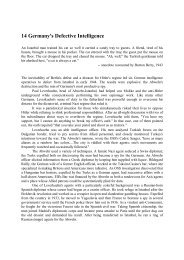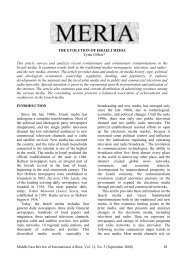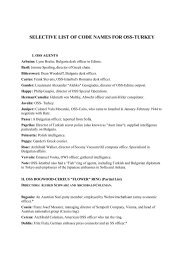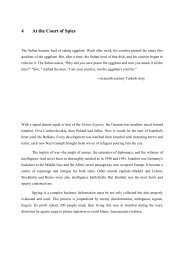on the jordanian economy - GLORIA Center
on the jordanian economy - GLORIA Center
on the jordanian economy - GLORIA Center
Create successful ePaper yourself
Turn your PDF publications into a flip-book with our unique Google optimized e-Paper software.
The Triumph of <strong>the</strong> Old Middle Eastbecame king of Iraq. In Iraq, a 1958 militarycoup overthrew that regime and created arepublic. Still, relati<strong>on</strong>s eventually recovered.During <strong>the</strong> 1980-1988 Iran-Iraq war, Jordanand its people genuinely supported Iraq both asa fellow Arab state and as a protector againstIran's brand of radical Islamism, giving <strong>the</strong>relati<strong>on</strong>ship an increasingly important strategicdimensi<strong>on</strong>. When Jordan faced a deepec<strong>on</strong>omic crisis in 1989, its Gulf friends refusedto help, fur<strong>the</strong>r increasing Baghdad's relativeimportance for Amman..The ec<strong>on</strong>omic aspect of relati<strong>on</strong>s was quitecritical in all <strong>the</strong>se years. During <strong>the</strong> war withIran, Jordan's ec<strong>on</strong>omy--includingtransportati<strong>on</strong>, trade, agriculture, and industry--all became essential for Iraq. In exchange, Iraqsupplied Jordan with cheap oil, grants, and lowinterestloans. Today, Iraq remains <strong>the</strong> majorsupplier of discounted oil and Iraqi c<strong>on</strong>tinues tobe <strong>the</strong> largest market for Jordanian products.Delivering <strong>the</strong>se goods in both directi<strong>on</strong>s hasbecome <strong>on</strong>e of <strong>the</strong> main pillars of Jordan'stransportati<strong>on</strong> sector.Jordan's ec<strong>on</strong>omy faced many problemsbefore <strong>the</strong> Gulf War. There was a highunemployment rate of 20 percent. The foreigndebt, exceeding $11 billi<strong>on</strong>, was triple <strong>the</strong>annual Gross Domestic Product (GDP). And<strong>the</strong> level of financial transfers from Jordaniansworking in <strong>the</strong> Gulf was declining.(3). As aresult, Jordan had to devalue its currency by 50percent in 1989. Ano<strong>the</strong>r factor was Jordan’ssensitivity to trade levels and its dependence <strong>on</strong>internati<strong>on</strong>al commerce. For instance, exportswere worth almost $1 billi<strong>on</strong> in 1989, with afur<strong>the</strong>r $181 milli<strong>on</strong> in goods being re-exportedthrough Jordan. C<strong>on</strong>sidering that Jordan’s GDPwas a mere $4.3 billi<strong>on</strong>, this is a staggeringfigure. No less important to Jordanian livingstandards, <strong>the</strong> country imported $2.16 billi<strong>on</strong>worth of goods in that same year.(4)Before <strong>the</strong> Gulf war, well over half ofJordan’s exports were sent to Gulf states. Iraqal<strong>on</strong>e was <strong>the</strong> market for 23 percent of itsexports; Saudi Arabia was generally <strong>the</strong> marketfor at least 10 percent more. Iraq’s importancewas underlined by <strong>the</strong> fact that it was <strong>the</strong> sourceof between 10 and 17 percent of total Jordanianimports by <strong>the</strong> late 1980s.(5)Largely as a reacti<strong>on</strong> to <strong>the</strong> problems ofdeficit and debt described above, <strong>the</strong>Internati<strong>on</strong>al M<strong>on</strong>etary Fund (IMF) pushedJordan to apply a tough ec<strong>on</strong>omic reformprogram to increase producti<strong>on</strong>, decreaseimports, reduce government spending, and stopgovernment subsidies. These steps led tomassive riots in April 1989 starting in Ma'an,capital of Jordan's transport sector, and sweptthroughout <strong>the</strong> country, forcing King Husseinto change <strong>the</strong> government and keep subsidiesfor most basic products. By 1990, Jordan'sec<strong>on</strong>omy had begun recovering from <strong>the</strong> 1989crisis but still needed serious domestic effort,internati<strong>on</strong>al support, and time to reach betterlevels of performance.(6)THE IMPACT OF THE GULF WARImmediately after <strong>the</strong> Iraqi invasi<strong>on</strong> ofKuwait, <strong>the</strong> UN Security Council passedResoluti<strong>on</strong> 661 which invoked ec<strong>on</strong>omic tradesancti<strong>on</strong>s against Iraq, a decisi<strong>on</strong> with whichJordan complied. UN sancti<strong>on</strong>s deeply affectedJordan’s interests and ec<strong>on</strong>omy since, as statedabove, Iraq was <strong>the</strong> largest Jordanian tradepartner for <strong>the</strong> previous ten years.Many Jordanian companies lost largeamounts because Iraqi companies were unableto repay <strong>the</strong>ir debts due to <strong>the</strong> sancti<strong>on</strong>s.Moreover, key Jordanian ec<strong>on</strong>omic sectors suchas transportati<strong>on</strong>, agriculture, and industry,mainly serving Iraq, were severely affected by<strong>the</strong> UN resoluti<strong>on</strong>. The Amman Chamber ofCommerce announced in November 1990 that<strong>the</strong> trade sancti<strong>on</strong>s had already cost Jordan $2billi<strong>on</strong>, and <strong>the</strong> loss was growing. According to<strong>the</strong> same source, <strong>the</strong>y expected it to reach $3.6billi<strong>on</strong> in 1991.(7) In additi<strong>on</strong>, before <strong>the</strong>resoluti<strong>on</strong> Iraq was supplying 80 percent ofJordanian oil at reduced prices.(8) Thesancti<strong>on</strong>s forced Jordan to import oil from <strong>the</strong>internati<strong>on</strong>al markets at <strong>the</strong> going rates.Iraq was highly dependent <strong>on</strong> Jordan as <strong>the</strong>route for importing and exporting neededproducts. Each year, milli<strong>on</strong>s of t<strong>on</strong>s of goodswere handled for Iraq in <strong>the</strong> Jordanian port ofMiddle East Review of Internati<strong>on</strong>al Affairs, Vol. 6, No. 2 (June 2002) 71


